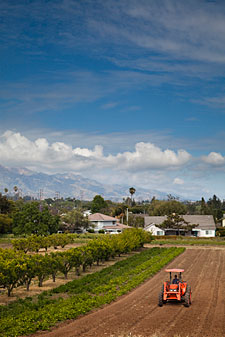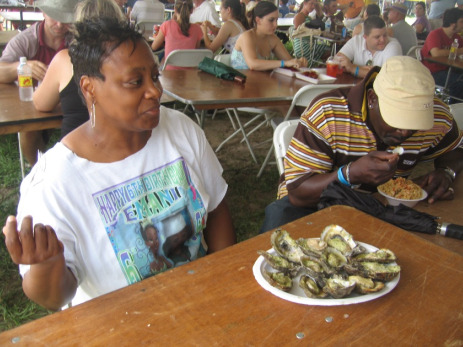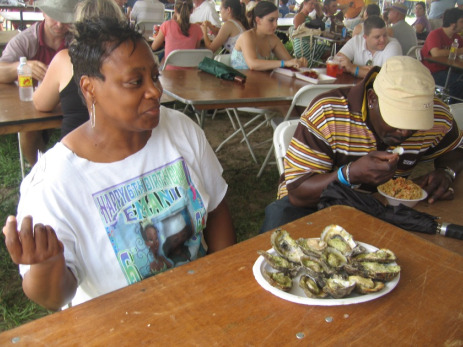 Seafood abounds at the Plaquemines Parish Seafood Festival.Photos: Emily PetersonThe sixth annual Plaquemines Parish Seafood Festival, held this past weekend, had the usual fixings one would expect at a South Louisiana festival: fried seafood, a solid lineup of live local music, and plenty of cold beer to beat the high humidity and 90-degree temperatures.
Seafood abounds at the Plaquemines Parish Seafood Festival.Photos: Emily PetersonThe sixth annual Plaquemines Parish Seafood Festival, held this past weekend, had the usual fixings one would expect at a South Louisiana festival: fried seafood, a solid lineup of live local music, and plenty of cold beer to beat the high humidity and 90-degree temperatures.
One element was notably absent: an apocalyptic focus on the oil spill.
Plaquemines Parish is ground zero in what is now considered “the biggest environmental disaster we’ve ever faced in this country,” as White House energy and climate change adviser Carol Browner put it on NBC’s Meet the Press this past Sunday.
The thick oil of the Gulf spill has already oozed into the inland marshes of Plaquemines Parish, jeopardizing the human communities and physical environment of this parish for generations to come. In a parish that’s 65 percent water, there are few jobs here without direct ties to the coast.
When BP officials announced on Saturday that the top-kill effort had failed, Plaquemines residents replaced any remaining glimmer of hope with a fatal desperation. The realization that oil will likely continue to spew uncontrollably into the Gulf for months has now set in, leading local fishermen to grow increasingly anxious as to whether they will ever recover their livelihoods.
Yet such concern hardly surfaced at the seafood festival. Instead, thousands of Plaquemines residents turned out to the fairgrounds, about 30 minutes south of New Orleans, to enjoy local delicacies such as platters of char-broiled oysters, softshell crab po-boy sandwiches, baskets of boiled shrimp, and bowls of crawfish jambalaya.
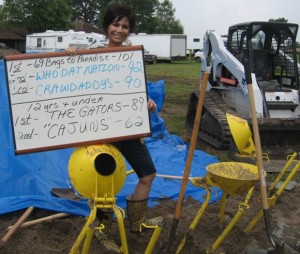 Allyson Lott, who presided over the Sandbagging Contest board.Teams of four could try their hand at the Sandbagging Contest, which entailed filling as many sandbags as possible in 15 minutes. To encourage participation and increase the stakes, Parish President Billy Nungesser chipped in $1,000 of his personal money as a cash prize.
Allyson Lott, who presided over the Sandbagging Contest board.Teams of four could try their hand at the Sandbagging Contest, which entailed filling as many sandbags as possible in 15 minutes. To encourage participation and increase the stakes, Parish President Billy Nungesser chipped in $1,000 of his personal money as a cash prize.
The contest was as practical as it was competitive: All of the assembled sandbags would be added to the parish’s stockpile for emergency response efforts. Just three weeks ago, during a high tide on the Mississippi River, the parish used 35,000 sandbags to protect community assets.
When I spoke to Allyson Lott, who presided over the contest winner’s board, she told me the top score this weekend was 101 bags. “But let me tell you,” she said, “last year’s winner of four-high school football players filled 139 bags — and their sand was wet and heavy!”
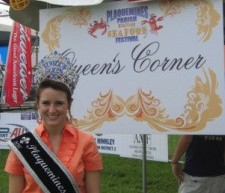 Seafood Queen Alexandra Belair.Next to the sandbagging staging ground was a tent for the festival’s “Seafood Queen,” who had been crowned the previous day. Nineteen-year-old Alexandra Belair received warm wishes from friends and guests as she sported leopard-printed rubber boots, a stylish twist on the area’s requisite industrial white shrimp boots.
Seafood Queen Alexandra Belair.Next to the sandbagging staging ground was a tent for the festival’s “Seafood Queen,” who had been crowned the previous day. Nineteen-year-old Alexandra Belair received warm wishes from friends and guests as she sported leopard-printed rubber boots, a stylish twist on the area’s requisite industrial white shrimp boots.
The only mention of the spill came from a tent tucked into the corner selling bright yellow “Dredge Baby Dredge” T-shirts, a nod to Louisiana officials’ plea for federal approval to dredge up walls of sand to protect fragile inland estuaries from the encroaching oil. The back of the shirt portrayed a mother pelican, the state bird, weeping over her newborn young as oil dripped onto their eggs.
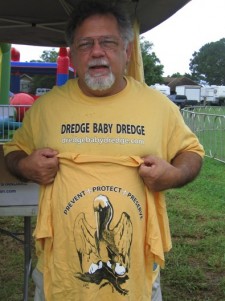 The “Dredge Baby Dredge” T-shirt.On Saturday, Nungesser made an official address. Over the past 40 days, he had appeared in countless press conferences and media interviews — from early morning shows like Good Morning America to Larry King Live at night. He reasoned the festival would be a brief reprieve from the disaster mentality, but moments before stepping on stage, he learned that the top-kill effort had failed.
The “Dredge Baby Dredge” T-shirt.On Saturday, Nungesser made an official address. Over the past 40 days, he had appeared in countless press conferences and media interviews — from early morning shows like Good Morning America to Larry King Live at night. He reasoned the festival would be a brief reprieve from the disaster mentality, but moments before stepping on stage, he learned that the top-kill effort had failed.
“I was about to address the crowd when I found out,” Nungesser said. “My knees got weak and I forgot everything I’d planned to say. I looked at those men and women in the crowd and I didn’t know what to tell them, my heart hurt so bad for them. I just told them stay encouraged, keep the faith — we’re going to beat this thing, and we’re not going to back down.”
Parish residents have taken those words to heart. As they did after the devastation of Hurricanes Katrina in 2005 and Gustave and Ike in 2008, locals are now displaying the same sense of steely resolve and resilience in the face of yet another ecological and financial disaster.
How long their indomitable spirit can endure remains in question.
